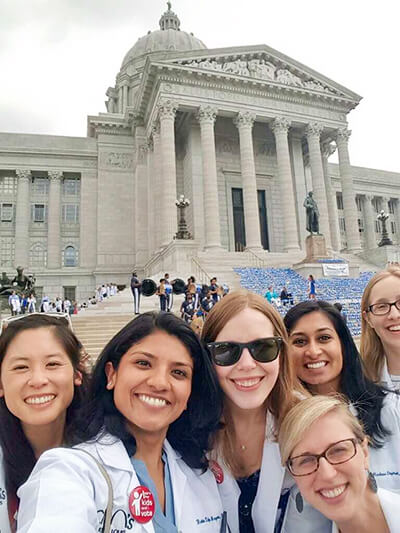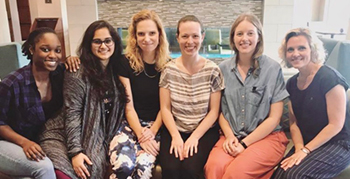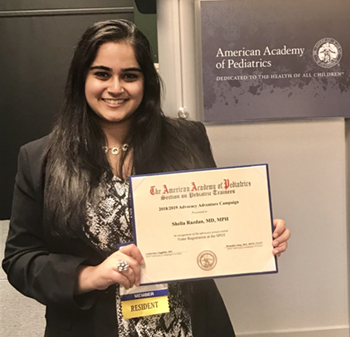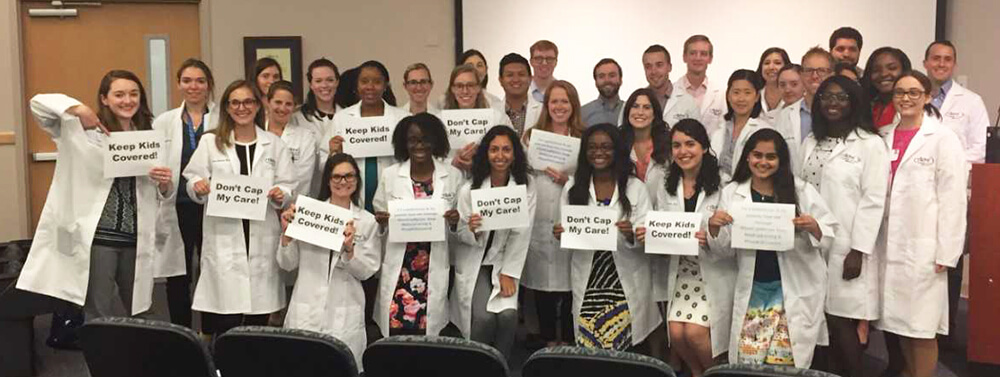Advocacy Pathway
Created by MOCARE, a statewide collaborative comprised of all four pediatric residency training programs in Missouri, the Advocacy Pathway aims to create advocacy leaders by supporting residents with an interest in placing advocacy and community pediatrics at the forefront of their pediatric career. Residents in the pathway will learn about child health disparities, the drivers of disparities at the state and national level and how pediatricians can help overcome these disparities by leveraging the media and impacting health policy.




Objectives
Advocacy education
- Didactics focused on key topics in advocacy
- Shared library of related medical literature, toolkits, and additional resources.
Advocacy scholarship
- Mentor residents in literature review, project development and implementation.
- Encourage development of scholarly work for submission to local, regional and national conferences and academic journals.
Community service
- Expose residents to local resources related to needs of vulnerable children.
- Support residents to form partnerships with community agencies for advocacy initiatives.
Community leadership development
- Provide training on one-on-one conversations, running effective meetings, identifying issues in the community that are meaningful to that community and how to cut and issue to create a winnable project.
System change
- Train residents in legislative advocacy and the role pediatricians’ play.
- Model successful coalition building and legislative advocacy at the state and federal level.
- Mentor residents to understand broader systems affecting child health.
- Establish mentoring relationships oriented toward leadership development
- Provide leadership training for residents in the Advocacy track.
Individualized curriculum
Each resident in the Advocacy Pathway will complete three advocacy block with a different focus each rotation. These rotations are designed to prepare residents to be lifelong participants in their communities and advocates for families.
- Pediatricians in Community rotation. This month is completed by all pediatric residents.
- Media and Health Policy.
- Medical Homes for Vulnerable Populations.
- Two blocks of independent elective for advocacy residents to implement their scholarly project.
Scholarship
Each advocacy resident completes a literature review on an advocacy/community pediatrics topic of interest. The purpose is to develop a deeper understanding of a specific advocacy concern, upon which residents can build additional expertise in other areas of advocacy.
Resident advocacy projects
Melanie Bryan, PL-3: For my project, I facilitated a partnership between the Taskforce for Teamwork and Cultural Competency (T2C2) and the Center for Families at SLCH, as well as Operation Food Search, to provide meal kits for patient families to take home upon leaving the hospital. These kits provide a balanced meal for a family of 4 and a breakfast item for the next day. I’m also working with T2C2 on developing a comprehensive food access proposal for the hospital and increasing staff education regarding food insecurity.
Sheila Razdan, Chief Resident: My project involved creating Missouri’s first voter registration program in a pediatric clinic. Now, teenagers and young adults can register to vote while in the waiting room at the SPOT, a free comprehensive clinic that offers medical care, mental health services, and drop-in activities for adolescents in St. Louis.
I presented my work at the 2019 Missouri AAP Annual Meeting and was recognized for my advocacy efforts by the Section on Pediatric Trainees at the 2019 AAP National Conference & Exhibition.
Conferences
MOCARE hosts an annual Leadership conference for all Advocacy Track residents from each of the four programs, as well as faculty members from each institution. This conference engages residents in leadership-building efforts, advocacy project development, and didactics on the state of health care in Missouri.
Residents in the pathway will learn about:
- Child health disparities
- The drivers of disparities at the state and national level
- What pediatricians can do about disparities by:
- working in the community
- leveraging the media
- impacting health policy
Contact information
Sarah Garwood, MD
Advocacy Pathway Director
Email: garwoods@wustl.edu
Sheila Razdan, MD, MPH
Current chief resident
Prior Advocacy Pathway resident
Email: sheila.razdan@wustl.edu
Are you ready?
Learn more about our application process.